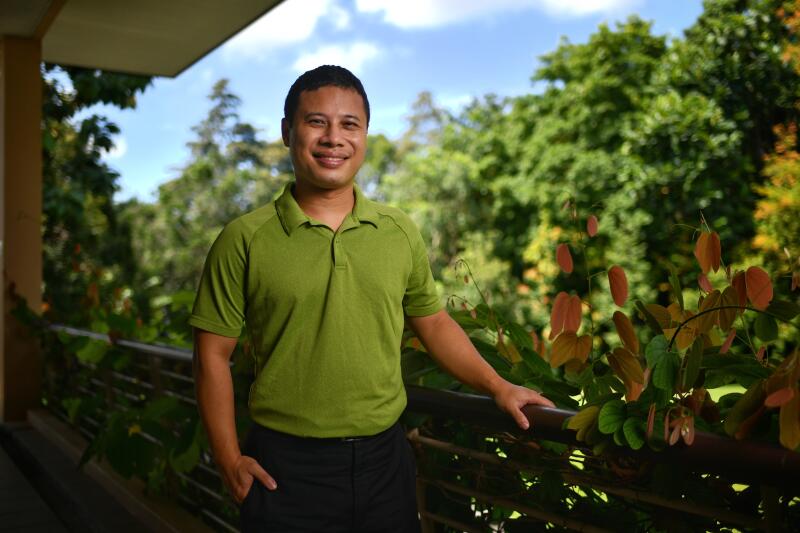Emerging Stronger Conversations: Sessions in more languages soon, will include people with disabilities
Some ideas from recent discussion will also be translated into action, says Desmond Lee
Sign up now: Get ST's newsletters delivered to your inbox

National Development Minister Desmond Lee gave the assurance that the ESC will be inclusive.
ST PHOTO: CHONG JUN LIANG
The Singapore Together Emerging Stronger Conversations (ESC), held in English so far, will soon be conducted in Mandarin, Malay and Tamil.
Efforts, too, will be made to involve persons with disabilities (PWDs), said National Development Minister Desmond Lee.
Mr Lee, who is also the co-chairman of the Emerging Stronger Task Force, gave the assurance that the ESC will be inclusive.
"We will find a way to reach out to communities that may not automatically step forward to sign up for these conversations, including making arrangements for PWDs to participate."
He was speaking to The Straits Times at the end of one such virtual conversation held on Sept 18.
After the session, the participants - including venture capitalists, students, and working adults - continued to engage one another on Zoom chat, and offered to help in areas such as career coaching for youth.
This action-oriented spirit, said Mr Lee, is how Singapore becomes stronger.
"People step forward and say 'well, we like the energy of what's happening, we like the spirit, and we want to play a part'.
"We are going to pursue some of their ideas, and they will be translated into action."
The 17-member Emerging Stronger Task Force, set up in May to help the country deal with the longer-term impact of the Covid-19 pandemic, aims to share its preliminary recommendations with the Future Economy Council (FEC) by early next year.
The task force comes under the FEC - which drives the growth and transformation of Singapore's economy for the future - and works closely with the council and its six sub-committees.
In June, representatives from social enterprises and arts groups, among others, issued an open letter to the task force, calling for greater representation from women, minorities and vulnerable communities.
Mr Lee said the work of the task force will not end with a one-off report. As the crisis is still evolving, the recommendations will be on a "rolling basis". "We're far from out of the woods. New dimensions will emerge, and new perspectives arise. We should then surface these ideas to the FEC."
Industry-led coalitions have been set up in seven key growth areas - robotics, e-commerce, environmental sustainability, digitalisation of supply chains and the built environment, education technology, and enabling safe travel, and tourism.
These Singapore Together Alliances for Action, which are partnerships between industry players and the Government, will quickly prototype new ideas to grow the economy and create jobs.
Some have already begun doing workshops on ideas.
Citing an example of a trade flow digitalisation workshop held recently, Mr Lee said the scale and energy of the discussion which he observed were remarkable.
The participants in the workshop, he added, were not chief executives but those on the front lines of industry.
"These are the people who are operating the systems and doing the trade documentation, imports and exports - the operators and practitioners who are identifying the pain points, and where the gaps and inefficiencies are."
But it cannot just be a technical exercise, he said. Instead, it has to reflect a collaborative spirit "that will hopefully allow us to be a cut above the rest".
Linking these efforts back to the Singapore Together movement launched by Deputy Prime Minister Heng Swee Keat in June last year to involve citizens more widely in shaping policies, Mr Lee said that it is about changing the way in which Singaporeans and the private and public sectors engage with one another, so as to close gaps and seize opportunities.
"This crisis is monumental. We have to reorientate and focus on the future through action, involving Singaporeans and friends of Singapore."
Separately, Minister in the Prime Minister's Office and Second Minister for Finance and National Development Indranee Rajah told The Straits Times that the Government is "listening intently" to the views coming through the ESC, including those that are different from current policy positions.
"This process of hearing and engaging with each other is important, so that as a society, we forge a common understanding of the future we want," she said.
"We want Singaporeans to be involved not just in conversation, but also in taking action and implementing ideas.
"I hope many will step forward as the action networks are formed, and find meaningful opportunities to co-create ideas and solutions."


